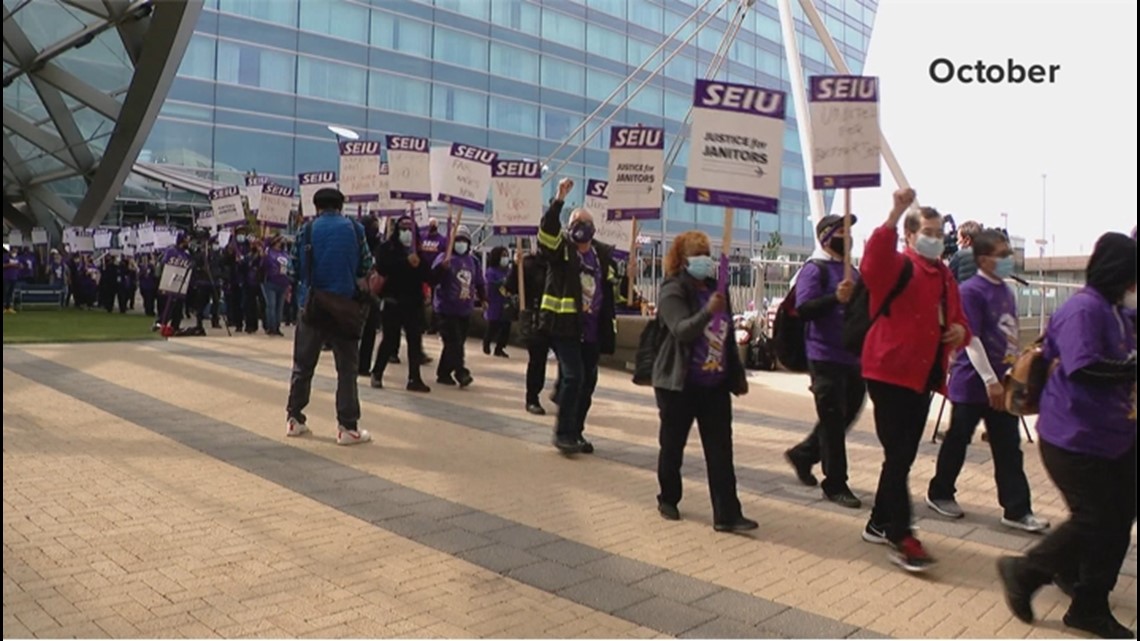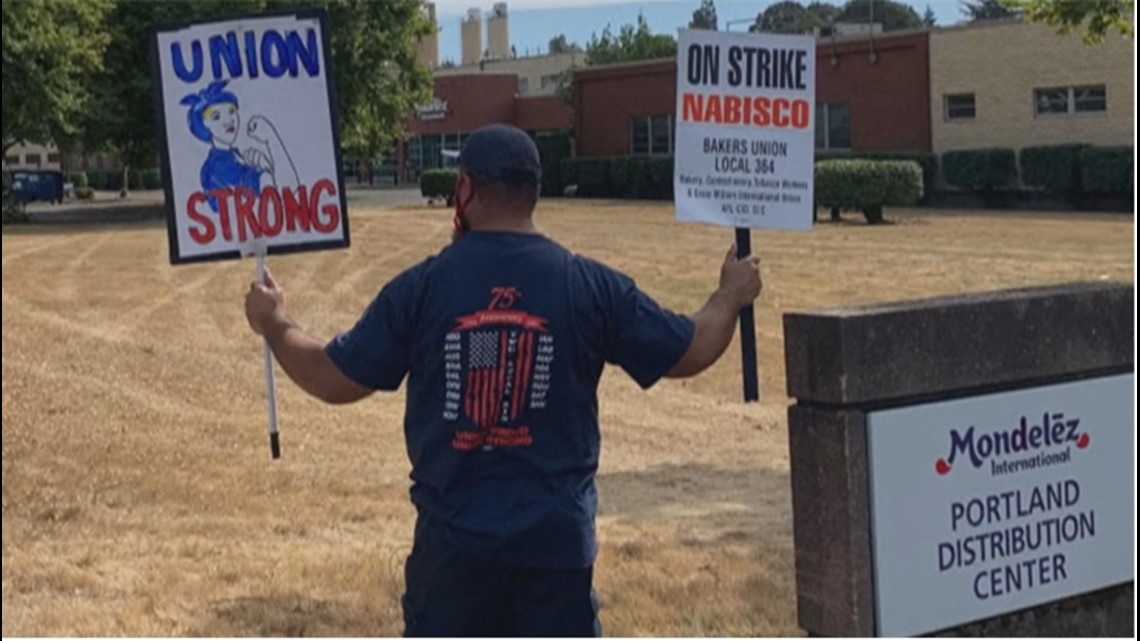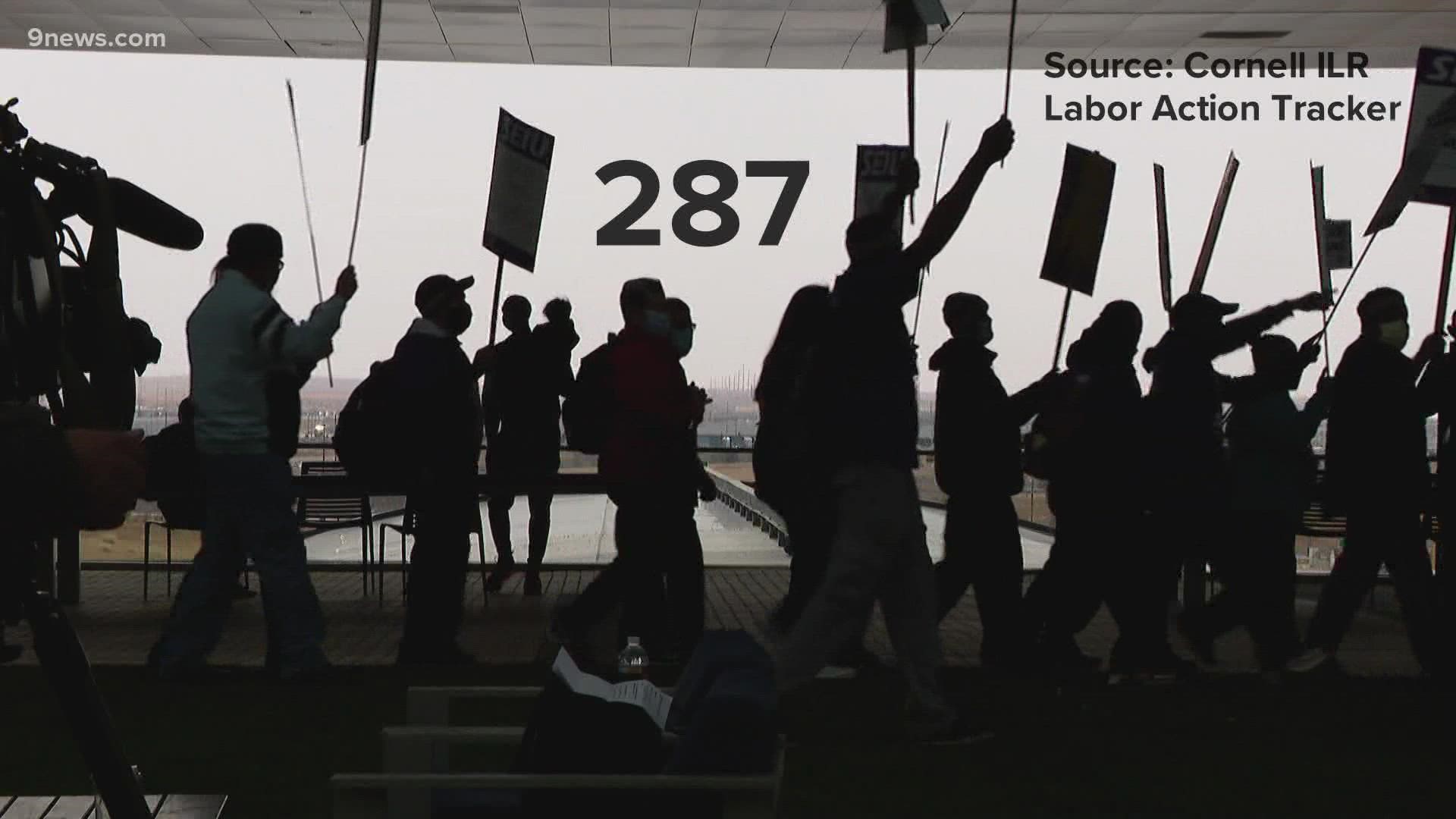AURORA, Colo. — The list of strikes this year by workers from around the country continues to grow, as does demand for those workers, due in part to labor shortages stemming from the COVID-19 pandemic.
Workers at Deere & Co., including some in Colorado, went on strike starting in mid-October.
Janitorial staff at Denver International Airport, who are members of the Service Employees International Union (SEIU) Local 105, went on strike in early October.
Workers for Nabisco in Aurora went to Portland, Ore., for more than a week to join their fellow employees for a strike.
While the strikes are typically backed by unions, there's no word on whether or not the recent string of strikes will prompt the formation of new union chapters, or new groups of workers to unionize.
Meanwhile, there is at least one effort underway in Aurora.


An attempt to unionize
Noah Canady has been working at an Aurora distribution center for HelloFresh, the meal kit delivery company that acquired Green Chef in 2018, for around a year now.
He said he noticed the boom in business right away, especially during the peak of the pandemic when more people were ordering to-go food to help stop the spread of COVID-19.
"People are ordering these boxes more than ever, and it makes sense. We're keeping people safe," he said.
Canady said that demand, coupled with the physical labor, made the job more taxing than he initially thought. He said he had experienced shoulder pain, and some of his friends and coworkers have called out to give their bodies a rest.
"And I end up getting promoted to where I don't have to use that muscle anymore. But to this day, like a couple of weeks ago, I felt that pain again. And it's like, is that pain going to stick with me for another few years?" Canady asked.
In part, it's instances like that, plus what he says is low pay, that prompted Canady to join the effort to unionize the workers. Canady is on the committee to push for unionization.
"I love all my friends, my coworkers. I'm happy working with them. It's just that I'm doing this job in a world pandemic, but I don't make enough money to save for a future, and that's what I want to change," he said.
Right now, the 350 eligible workers at HelloFresh's Aurora site are voting on whether or not to join the Local 23 chapter of UNITE HERE!, a union that represents food service industry workers, among others.
The vote, which is by mail-in ballot, lasts until Nov. 22 and will be counted by the National Labor Relations board.
According to Local 23 Denver Chapter President Kevin Abels, if more than 50% of the vote leans in favor of a union, it'll pass.
"It's like me and my friends, my coworkers, fighting for what we deserve and having a voice at our workplace. Because the truth of the matter is, I spend way more time at work than I do anywhere else. And yet when I go to work, I don't have a say in what happens. It's like, 'This is what you do. This is where you go.' And that's it. I have no control," he said. "I don't really have input on how things are written, and I have no input on how much I should get paid or my benefits. And that's why we're forming our union. And that's why we're changing that, because we should have a say in what happens at our workplace because we know it better than anyone else."
A spokesperson for HelloFresh, Robyn Schweitzer, emailed 9NEWS a statement regarding the effort, reading:
"At HelloFresh, our employees are at the heart of everything we do, and we are committed to their health, safety and wellbeing above all else. We believe in taking care of our employees and are committed to being an employer of choice in every community we operate, as demonstrated by our robust compensation and benefits packages. The decision of whether or not to be represented by a union is an important one and we respect each employee’s right to choose or refuse union membership. It’s a decision that impacts almost everything in an employee’s work life – from take-home pay to the culture that exists inside the workplace."
Schweitzer also said via email that on Oct. 24, the company announced an hourly wage increase for all workers across their U.S. distribution centers, and that benefits like health care, sick leave and 401(k) are available to all full-time HelloFresh employees.
Canady said he'd still like to form the union, in order to at least put forth effort in keeping the wage increase.
"And so what our union does and what we're going to fight for to make sure that's a contract so they can't just take it away later, and also fight for more," he said.
Schweitzer said the company is working with experts to support HelloFresh "in sharing the facts with employees at our distribution centers."
"To promote further education and create an open dialogue, we’re holding in-person stand-ups and meetings, so that employees can be fully informed and make the best decisions for themselves and their families," Schweitzer said. "We’re committed to being an employer of choice in every community we operate in and this commitment does not waver under potential union negotiations."
After a reported incident in June, Schweitzer said HelloFresh took immediate steps to correct the hazard, update protocols, and increase their onsite safety team headcount. Details on the incident were not initially provided via email. According to Colorado Public Radio reporting, the incident resulted in injury.
"Over the past 18 months, we’ve made significant investments in employee welfare and safety, and as a result we’ve seen a significant drop in safety incidents (or the “Total Recordable Incident Rate”) across all DCs. At this time, our Total Recordable Incident Rate (TRIR) rating is better than the industry average," Schweitzer wrote.


By the numbers
According to the Pew Research Center, the number of workers in the U.S. who say they're in a union has been nearly cut in half since 1983, when that number was 20%.
As of last year, 10.8% of workers said they were in a union.
In Colorado, just 7.4% of wage and salary workers were members of unions as of 2020.
But unions haven't lost too much support over the years.
According to the Pew report, "56% say the large reduction over the past several decades in the percentage of workers who are represented by unions has been 'somewhat' or 'very' bad for the country, while 60% say this has been bad for working people."
A Gallup Poll in September reported that the approval of labor unions is at its highest since 1965.
When it comes to strikes, the Cornell Labor Action Tracker shows more than 200 strikes across the country in 2021 alone. Colorado has had three.
Still, one expert said not to expect the current trends of fewer new unions compared to years past to change.
"The pressure on the labor market will express itself, in general, as reason to treat workers better," University of Colorado Boulder economics professor Jeffery Zax said. "And only in places where the worker, where the employers are really resistant to recognizing that reality, will the possibility of unionization become something more of a likelihood. So there may be some marginal change in the increase in the amount of unionization we see, but this is not going to reverse the overall trend."


An expert weighs in
Overall, Zax believes the number of unions has shrunk over the years due to an overall improvement in employment conditions.
"And so the demand for unionization on the part of workers has diminished. But in addition, employer opposition has increased and the rules regarding the unionization process have been altered so as to convey more advantages to the employers. In other words, employers resist unionization, and they have more effective means of doing that, partly because the rules have changed, partly because their tactics have changed," he said. "The third big factor in my mind is that the composition of the workforce has evolved away from jobs that were traditionally unionized and toward jobs that have traditionally been more difficult to unionize. So again, the shift from the manufacturing sector to the service sector--rather, the shift from an economy that emphasizes manufacturing more to an economy where the services are more prominent--that's going to shift away from workforces that were traditionally amenable to being unionized towards workforces that are less prudish, less amenable, traditionally."
And while we're seeing more strikes than some may be used to in the last decade, compared to historic highs, the number of strikes is quite small, according to Zax.
Zax said the pandemic put the labor market in a position where there are employers who want more workers than they can find at the salaries and compensation that they've been used to offering, and employers are finding that they struggle to fill the jobs.
He believes the pandemic is at the root cause of some of the recent strikes, as high demand and labor shortages may be impacting working conditions.
"That is, employers being faced with labor market conditions that they're not familiar with, and they're finding that the employment strategies that they have typically used aren't working anymore," Zax said. "Similarly, there are workers who are realizing they have opportunities that they weren't previously familiar with, and they're taking advantage of those opportunities. And so they're asking for, and they're asking their current employers to match, those opportunities."
Zax also said some employers have seen the formation of unions result in more efficiency in the workplace.
"The wage increases to some, and even to a complete, degree, can pay for themselves because they induce the firms to be more efficient and find productivity increases to compensate. So to the extent that that happens, consumers won't really feel it," he said. "To the extent that's not possible, then consumers will pay more."
Overall, the impact, at times, can trickle down to the consumer of the product where a strike happens.
"So yes, there may be some, some price increases. And I think we're seeing that. I think that's why the headline inflation number is higher than it's been in most of our recent memories. I believe that's a temporary reflection in part to adjustments in the relative supply and demand in the labor market," he said.
SUGGESTED VIDEOS: Latest from 9NEWS

